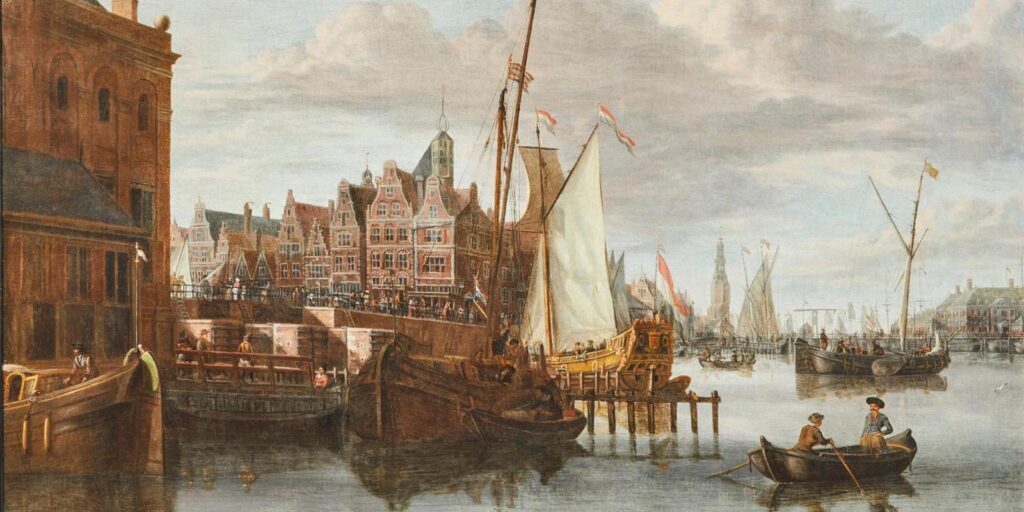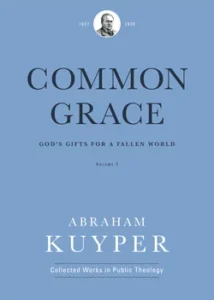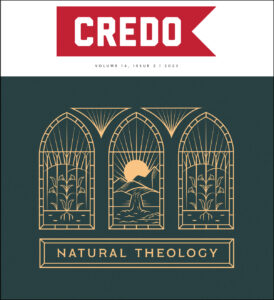
Kuyper on Common Grace
T he fixed historical starting point for the doctrine of common grace lies in God’s establishment of a covenant with Noah after the flood. In the past, inadequate attention has been paid to this significant and decisive event. People move too quickly to Abraham and the patriarchs, with the result that the weighty significance of the Noahic covenant initially slipped into the background and then was almost forgotten.
he fixed historical starting point for the doctrine of common grace lies in God’s establishment of a covenant with Noah after the flood. In the past, inadequate attention has been paid to this significant and decisive event. People move too quickly to Abraham and the patriarchs, with the result that the weighty significance of the Noahic covenant initially slipped into the background and then was almost forgotten.
Many people, including pious children of God, behold and admire the rainbow without being aware of the underlying covenant that is so powerfully addressing them. For that reason, we must begin with placing the lofty significance of that Noahic covenant in more radiant light once again. It must come alive for us once again, address us once again, become for us once again an essential component of the grace of God that sustains us.
What must then stand out in the foreground is that this covenant established by God with Noah appears in Holy Scripture not at all as a subordinate matter, and by no means does it appear incidentally as a matter of secondary importance. Rather, the establishment of the Noahickovenant is narrated to us more solemnly, more comprehensively, with greater detail than the establishment of either the covenant in paradise or the covenant with Abraham. The establishing of a covenant is not mentioned indirectly, but the establishment itself and the making of the covenant are included in the narrative as a historical event. What God the Lord spoke and testified about is communicated with meticulous details. The entire event is concluded with reference to a sign in the clouds that as a sacred covenant sign would remind people century after century of the steadfastness and truth of the Noahic covenant.Thus it is obvious that when the Lord our God gave the Holy Scriptures to his church, he clearly wanted to confirm for the church of all ages the remembrance of this covenant agreement. Click To Tweet
Thus it is obvious that when the Lord our God gave the Holy Scriptures to his church, he clearly wanted to confirm for the church of all ages the remembrance of this covenant agreement. He necessarily approved the detailed knowledge of this event for his church. And he desired that his church throughout the ages would take into account the significant and rich meaning of this covenant agreement. Our Heidelberg Catechism understood this as well, and its description of the providence of God, that “herbs and grass, rain and drought,” and so much more, “comes to us not by chance, but by his fatherly hand, was apparently taken from Genesis 8:22: “While the earth remains, seedtime and harvest, cold and heat, summer and winter, day and night, shall not cease.”
Noah became in fact the second progenitor of the human race; not that he replaced Adam, since Noah himself was the fruit of human procreation, as God had not directly formed Noah by his own hand. Noah inherited his nature and character from his parents and grandparents, which had not been the case with Adam. Adam was purely the product of God’s creative imagination. Nor was Noah’s wife taken from Noah’s side, as Eve was taken from Adam’s, but in Noah’s wife we also find the outworking of the ancestral nature of her parents, grandparents, and great-grandparents. And what applies to Noah and his wife applies as well for the wives of his sons. They too were the descendants and spiritual heirs of previous generations, bringing the corruption of these previous generations into Noah’s family.
S o it is absurd to want to put Noah on a par with Adam. As far as the source and the originality of their existence are concerned, they are simply not comparable. In Adam we find the source, the original fountain of all the generations of our human race. In Noah’s family we find the flowing together and intersection of the various streams that bv now had become tributaries. From our human race the only person who can be compared to Adam is the second Adam, the Man from heaven, by whom and in whom we once again find an entirely renewed source. Noah is our second progenitor; he is not a second head of our race.
o it is absurd to want to put Noah on a par with Adam. As far as the source and the originality of their existence are concerned, they are simply not comparable. In Adam we find the source, the original fountain of all the generations of our human race. In Noah’s family we find the flowing together and intersection of the various streams that bv now had become tributaries. From our human race the only person who can be compared to Adam is the second Adam, the Man from heaven, by whom and in whom we once again find an entirely renewed source. Noah is our second progenitor; he is not a second head of our race.
Although Noah occupies a more modest position, this much is certain, that the current of the different streams of humanity came to a standstill in him for one brief moment, and then came to divide from him again into diverse streams. You see such a phenomenon in higher elevations where the plateaus differentiate the higher mountain ranges from the lower bluffs, with all the little streams of those mountains flowing together into an azure lake that deepens into a basin, and from the other side of the lake water flowing out in to two or three streams that seek their way to the plateau below.
With Noah there was just such an incision, one that was extremely severe, one that cut into the life of our human race. Nothing survived from what preceded it, except what was present in Noah and his wife and his daughters-in-law, and from this fivefold fruit of earlier human life there sprouted the entire subsequent development of our human life. Noah and those eight souls did not form a new humanity. Rather, they are merely the continuation of the original human race. But now, after this ancient race was radically pruned by the Lord and was cut down to the root, such that in fact nothing but these five shoots survived, represented by those eight souls, who would soon cause the life of our race to spread out in three main branches, through Shem, Ham, and Japheth.The covenant does indeed benefit the church, and does have as its goal, if you will, the future flourishing of the church. Click To Tweet
So the ancient church of God was not cut off with the flood, in order to have begun as a newly formed entity with Noah’s family. But the church came forth out of paradise to Noah, borne by him in the ark, proceeding from the ark to dwell upon the earth once again, and in this way continued its original existence in Noah’s generation. The only difference is that after the flood the church appeared in a new condition. Shem would expand its tents; Japheth would be the first to depart from the church and later return; and Ham would forego its blessing.
The establishment of the Noahic covenant is also properly related to the future of God’s church, but this relationship is in terms of the alteration that our general human life underwent. In this Noahic covenant there is after all nothing that intentionally or primarily pertains to saving grace. It involves neither forgiveness of guilt and sin, nor promise of adoption and eternal life. Salvation is not being bestowed on some, but in this covenant God’s promise extends to all the children of men. The covenant does indeed benefit the church, and does have as its goal, if you will, the future flourishing of the church. This covenant seeks to make the church possible and to secure a place of rest for the church, but it does not involve the church as such. This covenant involves man as man, man in his society on earth with other men, man in his relationship to the animals, and man in his relationship to the destructive elements of nature.
After Noah the situation of our entire earth was different than before; and on that earth the situation of our human race and of our human life is in many respects different than in the days before the flood came. We know very little of the situation that existed before the flood. We read of people with a life span of almost ten centuries. We read of the outbreak of violence, of a devout generation that maintained the fear of the Lord; and of the earliest development of human artistic capacity. But we also read of a frightening crisis that gave godless people supremacy and made unrighteousness and violence increase rapidly.
Finally all of human life appears to have degenerated into wantonness, sensuality, and bloodshed until, after Enoch’s removal, only in Noah’s family did the sacred service of the Lord continue. But only those general features are mentioned. We are not given many details. There is no material at hand to fuel our imagination. What the opening chapters of Genesis offer you is not an interesting story for stimulating your curiosity, but a completely sober portrait sketched in outline, with broad strokes, in order to humble you as a member of the human race in your human understanding.
So gloriously had paradise been opened, so abundantly blessed by God, and look, that is what our human race brought forth from its own wicked root, until at last the judgment of the Almighty is issued, that “every intention of the thoughts of his heart was only evil continually” (Gen 6:5b). You can see clearly that if the One who created us had not intervened and had not called into being a new order of things, that is, a new living situation, the church would have ceased to exist, and our entire race would have perished in its own pitiful ungodliness. Only in one family was the fear of the Lord still flourishing. How long would it have been until this particular family would also have been swallowed up by the universal stream?
Exactly what took place cannot be determined with precision. What Holy Scripture tells us about it is expressed with majesty and written down with ornate, impressive language, but it refrains from recording all the details.
The traditions of the ancient peoples tell us little more than the recollection of an awesome event. And what the investigation of this earth, of its surface, of its mountains and its core have taught us thus far indicates that colossal changes have taken place, but it still lacks the graphic detail and exactitude of history. Meanwhile, this much is certain, that even if Holy Scripture had been silent about the flood, and even if the traditions of the peoples had contained no recollection of an event like this, simply observing the earth in its mountainous regions, and exploring the earth’s surface in almost every country, would provide us the certainty that a massive cataclysm had taken place on this earth, one that altered the entire form of the earth and completely altered even its climatic patterns.
When God had completed his work in paradise, and had crowned humanity as lord of creation, God saw “that everything was good” and our entire earth, as it had come forth from God’s hand, must originally have displayed the image of complete harmony and purity.
The above excerpt is from Common Grace: God’s Gifts for a Fallen World, Volume 1 by Abraham Kuyper. Published by Lexham Press; Acton Institute, 2015. Used by permission.

